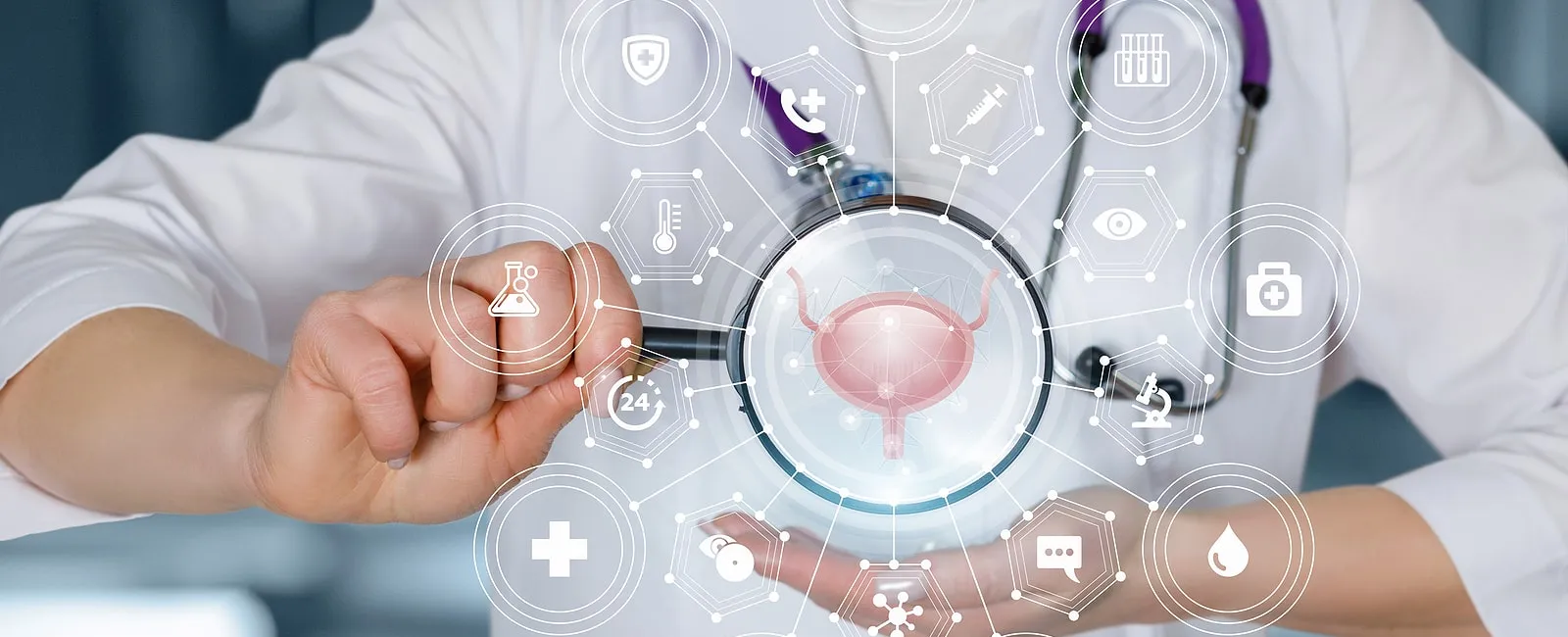At some point in your life you’ve likely experienced bladder discomfort or pain while urinating. For most people, this can be attributed to dehydration or a urinary tract infection and can be treated with increased fluids or antibiotics. However, if you have ongoing discomfort or tenderness in your pelvic area, frequently experience the sudden need to urinate, or find you are going to the restroom more than you previously did, you may have interstitial cystitis.
What is interstitial cystitis?
Interstitial cystitis (IC) is a painful bladder condition that affects millions of men and women in the United States. Women are twice as likely as men to have interstitial cystitis. Stages of interstitial cystitis can range from mild discomfort in the pelvic area to feeling the need to urinate so frequently you may be afraid to leave home.
Interstitial cystitis is typically diagnosed by ruling out other conditions that cause bladder pain or frequent urination. Sometimes, a procedure called hydrodistension of the bladder is used, where your doctor will fill your bladder with fluid and guide a small camera inside to identify what may be causing your pain. The exact cause of interstitial cystitis is unknown, and varies from person to person, however, there have been recent links between interstitial cystitis and recurrent UTI (urinary tract infection).
Symptoms of interstitial cystitis ebb and flow. When symptoms suddenly and drastically worsen, it is known as a “flare.” Different factors are associated with interstitial cystitis flares.
What causes interstitial cystitis flares?
Interstitial cystitis, also known as “painful bladder syndrome,” can have flares triggered by environmental, physical, and social-emotional reasons. Triggers are unique to each person. What causes a flare in one person, may not in the next. However, there are common factors identified by researchers that are likely to trigger interstitial cystitis flares. These include:
- Diet
- Exercise
- Sexual intercourse
- Medications
- Hormone fluctuations
- Stress
- Tight Clothing
How to calm an interstitial cystitis flare
If you feel an IC flare coming on, start treating it as soon as possible. Try these strategies for relief.
- Increase water intake – Drinking more water may help curb the severity of your symptoms.
- Take medication – Your healthcare provider may prescribe medication when you have a flare.
- Hot / cold therapy – Take a warm sitz bath or apply a cold pack or heating pad to the perineum (area between the vagina and anus in women and between the base of the penis and anus in men).
- Relax your pelvic muscles – Move into a stretch or position that promotes relaxation of the pelvic muscles. Examples include a squatting position, pulling your knees against your chest, or reclining and spreading your legs open.
The best approach to handling an interstitial cystitis flare is to identify your triggers and modify your lifestyle to prepare for, or avoid them.
Tips for handling specific IC triggers
- Sexual Intercourse Flares – Unfortunately, for some people, interstitial cystitis and sex are connected. Sexual intercourse can lead to interstitial cystitis flares. To prevent flares from intimacy, try taking pain-reducing and anti-spasmodic medications prior to sex, use lubricant during intercourse, and after sex take a sitz bath or ice your perineum.
- Clothing Flares – If you feel a flare coming on while you’re wearing athletic pants, pantyhose, tight jeans, or slimming undergarments, remove them immediately. Opt for clothing that is not constrictive and fits loosely around the waist and pelvic region.
- Diet flares – While research consistently shows no links between certain foods or drinks to IC, there is a strong relationship between diet and painful bladder syndrome. Dietary modification can lessen the severity of your symptoms. Coffee, soda, caffeinated beverages, tomatoes, spicy foods, high-acid foods, citrus, and MSG can all trigger IC symptoms. If you have a flare, journal what you ate prior to it. This will help you identify foods that could be causing your IC flares and allow you to avoid these in the future.
Treatment of interstitial cystitis
Sometimes, despite making lifestyle modifications and implementing strategies to cope with interstitial cystitis flares, symptoms become so severe they prevent you from participating in daily activities and can affect your quality of life. There are treatment options available beginning with conservative medications and spanning to surgery for interstitial cystitis. Surgery can range from bladder instillations, where your doctor will insert a medication directly into your bladder, to bladder resection, where your doctor will remove ulcers from the bladder using minimally invasive technologies. Your doctor will work with you to create an individualized treatment plan.
How do I find doctors who treat interstitial cystitis near me?
Receiving an interstitial cystitis diagnosis is the first step in receiving treatment and returning to a more fulfilling life. A urogynecologist or urologist can examine you and determine if you have interstitial cystitis and what might be causing it. When you are searching for your doctor, make sure they are board-certified, ask questions about what kind of treatment options they offer, and find out what procedures they perform. Your doctor will work with you to create the best course of treatment for your individual needs.
